It looks like you're using an Ad Blocker.
Please white-list or disable AboveTopSecret.com in your ad-blocking tool.
Thank you.
Some features of ATS will be disabled while you continue to use an ad-blocker.
18
share:
Why this thread?. I saw the mini series Saints and Strangers, about the landing of the May flower and their encounter with the native Americans, one
figure stands out that of Tisquantum or Squanto a masterful negotiator and fixer first captured as a slave and taken to Spain
Now I wanted to know more about his life in Europe, but also the lives of individuals or groups that was there since the return of Columbus's ship a century and a half earlier, but in my search I came across this genetic based article .
Europe's family tree has a THIRD branch: Link in genetic connection between Modern Europeans and Native Americans found
Read more: www.dailymail.co.uk... l#ixzz3skq21Cqn
Follow us: @MailOnline on Twitter | DailyMail on Facebook
So wow! this will most definitely put my search further back in time pls klik the above for more, if the above is true then Native American were making trips back to the old world in the distant past, I see no reason why they would/could not do the same at a later date on their own initiative.
But the story of individual native American experience in the old world is proving very difficult to track down,we know that some became sailors ,on European ships
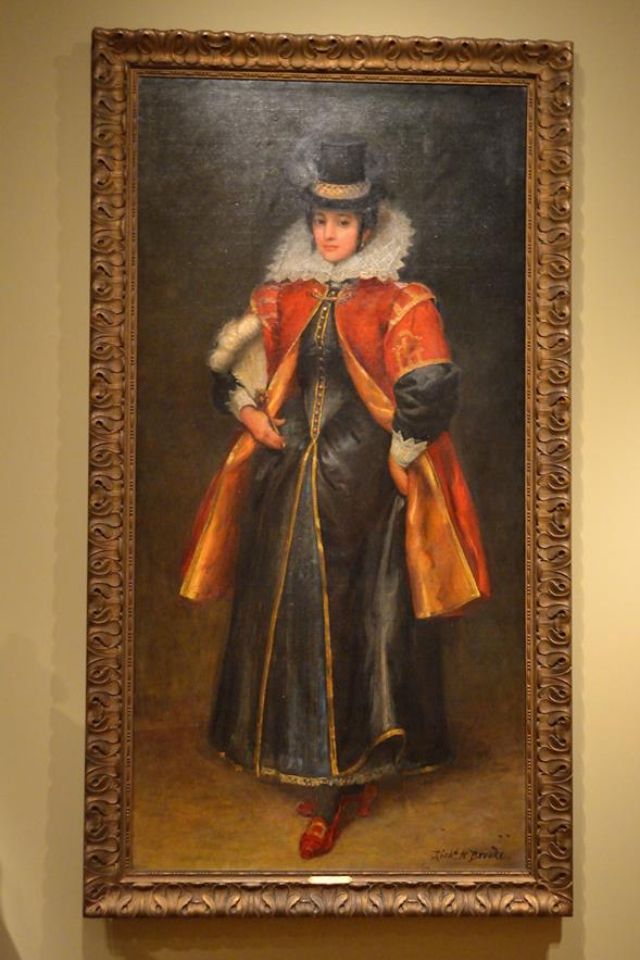
A full-length portrait of Pocahontas, which was done after she traveled overseas to England. Jamestown Museum. Pocahontas (born Matoaka, and later known as Rebecca Rolfe, c. 1595 – March 1617) was a Virginia Indian with a close association with the Jamestown colonists. She married an Englishman, John Rolfe, and they had one son, Thomas.
www.pinterest.com...
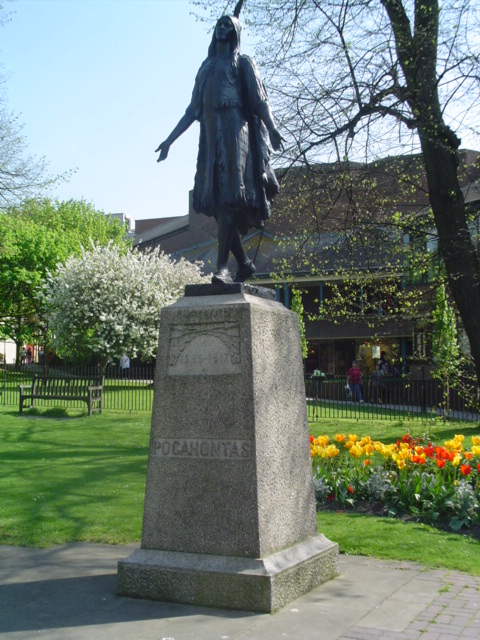
Statue of Pocahontas in Saint George's church, Gravesend, Kent, England

Pocahontas and son .stands out wiki sourced but portrait is said to be debated.
Tisquantum. He had somehow found himself passage from Malaga, Spain into England, where he began living with John Slaney in Cornhill, London, and began picking up the English language. John Slaney was the treasurer of the Newfoundland Company which had managed to place a colony at Cupper's Cove (Cupids), Newfoundland in 1610; he employed Tisquantum, presumably as an interpreter and as an expert on North American natural resources. He was sent to Newfoundland, and worked there with Captain John Mason, governor of the Newfoundland Colony.
mayflowerhistory.com...
Now I wanted to know more about his life in Europe, but also the lives of individuals or groups that was there since the return of Columbus's ship a century and a half earlier, but in my search I came across this genetic based article .
Europe's family tree has a THIRD branch: Link in genetic connection between Modern Europeans and Native Americans found
Read more: www.dailymail.co.uk... l#ixzz3skq21Cqn
Follow us: @MailOnline on Twitter | DailyMail on Facebook
So wow! this will most definitely put my search further back in time pls klik the above for more, if the above is true then Native American were making trips back to the old world in the distant past, I see no reason why they would/could not do the same at a later date on their own initiative.
But the story of individual native American experience in the old world is proving very difficult to track down,we know that some became sailors ,on European ships

A full-length portrait of Pocahontas, which was done after she traveled overseas to England. Jamestown Museum. Pocahontas (born Matoaka, and later known as Rebecca Rolfe, c. 1595 – March 1617) was a Virginia Indian with a close association with the Jamestown colonists. She married an Englishman, John Rolfe, and they had one son, Thomas.
www.pinterest.com...

Statue of Pocahontas in Saint George's church, Gravesend, Kent, England

Pocahontas and son .stands out wiki sourced but portrait is said to be debated.
The company decided to bring Pocahontas to England as a symbol of the tamed New World "savage" and the success of the Jamestown settlement. In 1616, the Rolfes traveled to England, arriving at the port of Plymouth on June 12.They journeyed to London by coach, accompanied by a group of about eleven other Powhatans, including a holy man named Tomocomo.John Smith was living in London at the time and while Pocahontas was in Plymouth, she learned he was still alive. Smith did not meet Pocahontas, but wrote to Queen Anne, the wife of King James, urging that Pocahontas be treated with respect as a royal visitor. He suggested that if she were treated badly, her "present love to us and Christianity might turn to ... scorn and fury", and England might lose the chance to "rightly have a Kingdom by her means".
Pocahontas was entertained at various society gatherings. On January 5, 1617, she and Tomocomo were brought before the king at the old Banqueting House in the Palace of Whitehall at a performance of Ben Jonson's masque The Vision of Delight. According to Smith, King James was so unprepossessing that neither Pocahontas nor Tomocomo realized whom they had met until it was explained to them afterward.
Although Pocahontas was not a princess in the context of Powhatan culture, the Virginia Company nevertheless presented her as a princess to the English public. The inscription on a 1616 engraving of Pocahontas, made for the company, reads: "MATOAKA ALS REBECCA FILIA POTENTISS : PRINC : POWHATANI IMP:VIRGINIÆ", which means: "Matoaka, alias Rebecca, daughter of the most powerful prince of the Powhatan Empire of Virginia". Many English at this time recognized Powhatan to be the ruler of an empire, and they presumably accorded to his daughter what they considered appropriate status. Smith's letter to Queen Anne refers to "Powhatan their chief King"
en.wikipedia.org...
Shakespeare's Indian: The Americanization of Caliban
www.jstor.org...
Like other out of place foreigners Shakespeare had a view on the native American in the form of Caliban, but I am still searching for the native American's view of their surrounding outside their native lands, if folks out there have a link of something that looked like a biography please post.
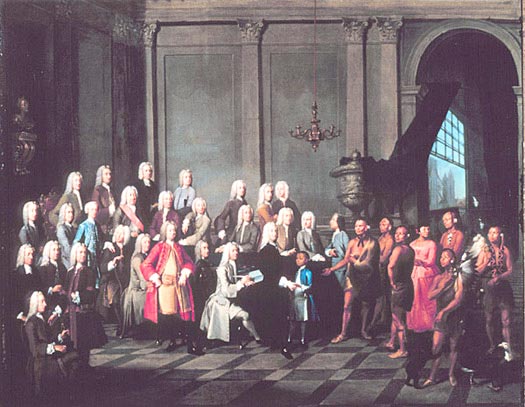
Yamacraw Creek Native Americans meet with the Trustee of the colony of Georgia in England, July 1734. Notice the Native American boy (in a blue coat) and woman (in a red dress) in European clothing.
en.wikipedia.org...#/media/File:Tomo-chi-chi_and_other_Yamacraws_Native_Americans.jpg
www.jstor.org...
Like other out of place foreigners Shakespeare had a view on the native American in the form of Caliban, but I am still searching for the native American's view of their surrounding outside their native lands, if folks out there have a link of something that looked like a biography please post.

Yamacraw Creek Native Americans meet with the Trustee of the colony of Georgia in England, July 1734. Notice the Native American boy (in a blue coat) and woman (in a red dress) in European clothing.
en.wikipedia.org...#/media/File:Tomo-chi-chi_and_other_Yamacraws_Native_Americans.jpg
edit on 27-11-2015 by Spider879 because: (no reason given)
originally posted by: Spider879
Today I ran across a reference to the Powhatans Cuture.
They had a term "wintiko" (in Powhatan) that was used
to describe the disease of White People.
Wétiko is a Cree term for the same disease: Greed.
Here is the quote:
Wétiko = Greed (white man's disease)
"to consume the life of another for private purpose or profit.”
The company decided to bring Pocahontas to England as a symbol of the tamed New World "savage" and the success of the Jamestown settlement. In 1616, the Rolfes traveled to England, arriving at the port of Plymouth on June 12.They journeyed to London by coach, accompanied by a group of about eleven other Powhatans,
Although Pocahontas was not a princess in the context of Powhatan culture, the Virginia Company nevertheless presented her as a princess to the English public.
Today I ran across a reference to the Powhatans Cuture.
They had a term "wintiko" (in Powhatan) that was used
to describe the disease of White People.
Wétiko is a Cree term for the same disease: Greed.
Here is the quote:
Were Columbus and his fellow Christian European cohorts and successors for the next five hundred years simply greedy sociopathic sub-humans who would tolerate mass exploitation, racism, theft, brutality, sadism and genocide? Native American historian Jack D Forbes in his book Columbus and other Cannibals: The Wétiko Disease of Exploitation, Imperialism, and Terrorism states that the overriding characteristic of a wétiko, a Cree word literally meaning “cannibal,” is “that he ‘consumes’ other human beings for profit, that is, he is a cannibal”.
By cannibalism Forbes does not necessarily mean eating the flesh of another human, but defines the concept in an extended metaphor as a form of spiritual dysfunction and psychopathic behavior, even insanity, in which in all its multifarious ways greedy predatory men have exploited and murdered and destroyed the cultures (most often indigenous peoples) of other humans deemed “savages” via war, colonialism and imperialism. In his own words Forbes informs us that “wétiko is a Cree term (windigo in Ojibway, wintiko in Powhatan) which refers to a cannibal or, more specifically, an evil person or spirit who terrorizes other creatures by means of terrible acts…the consuming the life of another for private purpose or profit.”
He tells us that for the wétiko, “Brutality knows no boundaries. Greed knows no limits. Perversion knows no borders. . . . These characteristics all push towards an extreme, always moving forward once the initial infection sets in. . . . This is the disease of the consuming of other creatures’ lives and possessions.”
www.skeptic.ca...
Wétiko = Greed (white man's disease)
"to consume the life of another for private purpose or profit.”
edit on 27-11-2015 by wasaka because: (no reason given)
edit on 27-11-2015 by wasaka because: (no reason given)
a reply to: wasaka
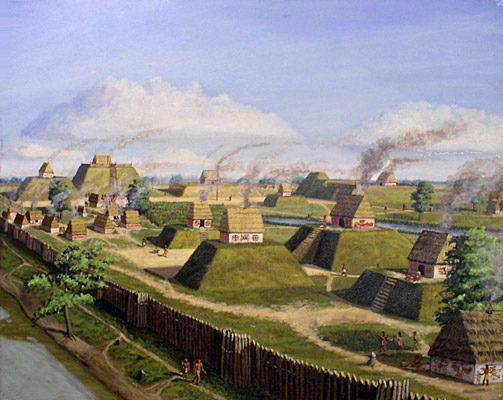
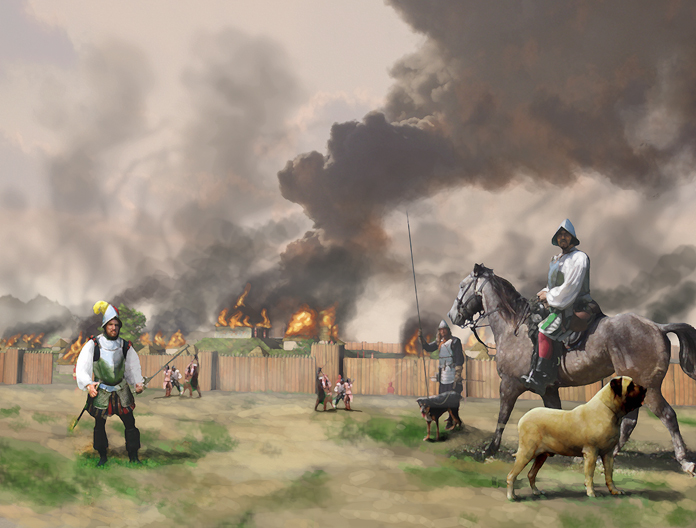
Much thanks, I am looking into the Battle of Mabila ,cross checking with other sources but sometimes they did resist diseases and even triumph if biefly in battle.

The Mississippian culture was a mound-building Native American culture that flourished in the United States before the arrival of Europeans.

Much thanks, I am looking into the Battle of Mabila ,cross checking with other sources but sometimes they did resist diseases and even triumph if biefly in battle.
We entered the town and set it on fire, whereby a number of Indians were burned, and all that we had was consumed, so that there remained not a thing. We fought that day until nightfall, without a single Indian having surrendered to us- they fighting bravely on like lions. We killed them all, either with fire or the sword, or, such of them as came out, with the lance, so that when it was nearly dark there remained only three alive; and these, taking the women that had been brought to dance, placed the twenty in front, who, crossing their hands, made signs to us that we should come for them. The Christians advancing toward the women, these turned aside, and the three men behind them shot their arrows at us, when we killed two of them. The last Indian, not to surrender, climbed a tree that was in the fence, and taking the cord from his bow, tied it about his neck, and from a limb hanged himself.
en.wikipedia.org...
a reply to: Spider879
I disagree on this one. Ancestral Altaic, A.K.A these "northern Eurasian genetics" from the article are the same thing. Those population definitions further merge into "Siberian" and/or "Asian Russia" (dependent upon how they are classifying things and drawing their population lines on the map) which makes the heritage genetics on this even muddier yet. While it's the same font as the native American's it's still in Eurasia not the Americas. The genetic stamp on this (Ancestral Altaic vs. distinctly native American) is not nearly as clear cut as people think. Unless you have a great grandparent (or closer) that was at least half native American it can get weird.
Even known Native American heritage has and does get mixed up and mislabeled as even "east Asian" as well in heritage tests in a sort of blow back effect. This is a ridiculously messy ethnicity to pin down and I've been beating my head against it in my own genetics for weeks. It's not wise to take these population and heritage designations too literally even in the best of circumstances but this one in particular is a nightmare to sort out and I wouldn't extrapolate anything too off the beaten path because of it's prevalence in Europeans. It's explainable by something far simpler and more likely than admixture events from the Americas that predate European colonization or exploration, or even just enough Native Americans somehow mixing with European populations in Europe enough to create that much of a genetic stamp.
I highly doubt that Native Americans were traveling to Europe from the Americas, but the descendants of the ones who stayed (instead of the ones who migrated to the Americas) sure still mixed up with northern European "white" populations plenty, in repeated admixture events, and fairly recently to boot, which would account for that similarity. Plenty of Europeans have North Eurasian/Ancestral Altaic in at least trace amounts. I wouldn't classify it as a third branch per se, although, I suppose acknowledging such an admixture could make some people uncomfortable.
I disagree on this one. Ancestral Altaic, A.K.A these "northern Eurasian genetics" from the article are the same thing. Those population definitions further merge into "Siberian" and/or "Asian Russia" (dependent upon how they are classifying things and drawing their population lines on the map) which makes the heritage genetics on this even muddier yet. While it's the same font as the native American's it's still in Eurasia not the Americas. The genetic stamp on this (Ancestral Altaic vs. distinctly native American) is not nearly as clear cut as people think. Unless you have a great grandparent (or closer) that was at least half native American it can get weird.
Even known Native American heritage has and does get mixed up and mislabeled as even "east Asian" as well in heritage tests in a sort of blow back effect. This is a ridiculously messy ethnicity to pin down and I've been beating my head against it in my own genetics for weeks. It's not wise to take these population and heritage designations too literally even in the best of circumstances but this one in particular is a nightmare to sort out and I wouldn't extrapolate anything too off the beaten path because of it's prevalence in Europeans. It's explainable by something far simpler and more likely than admixture events from the Americas that predate European colonization or exploration, or even just enough Native Americans somehow mixing with European populations in Europe enough to create that much of a genetic stamp.
I highly doubt that Native Americans were traveling to Europe from the Americas, but the descendants of the ones who stayed (instead of the ones who migrated to the Americas) sure still mixed up with northern European "white" populations plenty, in repeated admixture events, and fairly recently to boot, which would account for that similarity. Plenty of Europeans have North Eurasian/Ancestral Altaic in at least trace amounts. I wouldn't classify it as a third branch per se, although, I suppose acknowledging such an admixture could make some people uncomfortable.
The Native Americans were some tough stock. Mix that with Irish and German immigrants and we have ourselves a bad ass here. Love you grandpa.
a reply to: redhorse
That is pretty much the case what redhorse wrote in general. I am also doing genetic research of my ancestry and wondered where did i get native indian blood 2% .
I have a long familytree and very strong Viking heritage also monarchs of Europe ( Royal houses of Sweden, Dane, Norway, wessex, Charlemagne etc ), and only road to native blood points to Vikings, unless nobles mixed up with native americans.
That is pretty much the case what redhorse wrote in general. I am also doing genetic research of my ancestry and wondered where did i get native indian blood 2% .
I have a long familytree and very strong Viking heritage also monarchs of Europe ( Royal houses of Sweden, Dane, Norway, wessex, Charlemagne etc ), and only road to native blood points to Vikings, unless nobles mixed up with native americans.
a reply to: wasaka
That would explain so much.
However, we seem to view the natives through a strange scope. Not all tribes were the same and certainly not all benevolent. The Dine or Navajo are quite wealthy or at least those with casinos. The pueblos, Hopi, etc are fundamentally different than their Dine counterparts.
I also suspect the Dine originated North in Alaska/Canada and migrated south to the Four Corners region. Perhaps even learned domestication, herding, etc from the local pueblos. Than eventually proceeded to assimilate them.
Of course the storyline differs on who you ask but I have spoken to a few from each and the dynamics are indeed intense. Anasazi = Ancient Enemy.....they weren't kidding.
I bring this up because it seems the Navajo had a little "Cree" in them.
Interestingly, the Navajo/Dine has an offshoot tribe the name escapes me right now but translates to "skin walker" and indeed is where the name Skinwalker Ranch" originates I believe. The "Skin Walkers" in itself is a whole other story and no doubt many details up for debate but it does muddy the understanding of Greed being a white mans disease.
That would explain so much.
However, we seem to view the natives through a strange scope. Not all tribes were the same and certainly not all benevolent. The Dine or Navajo are quite wealthy or at least those with casinos. The pueblos, Hopi, etc are fundamentally different than their Dine counterparts.
I also suspect the Dine originated North in Alaska/Canada and migrated south to the Four Corners region. Perhaps even learned domestication, herding, etc from the local pueblos. Than eventually proceeded to assimilate them.
Of course the storyline differs on who you ask but I have spoken to a few from each and the dynamics are indeed intense. Anasazi = Ancient Enemy.....they weren't kidding.
I bring this up because it seems the Navajo had a little "Cree" in them.
Interestingly, the Navajo/Dine has an offshoot tribe the name escapes me right now but translates to "skin walker" and indeed is where the name Skinwalker Ranch" originates I believe. The "Skin Walkers" in itself is a whole other story and no doubt many details up for debate but it does muddy the understanding of Greed being a white mans disease.
originally posted by: Rosinitiate
a reply to: wasaka
That would explain so much.
However, we seem to view the natives through a strange scope. Not all tribes were the same and certainly not all benevolent. The Dine or Navajo are quite wealthy or at least those with casinos. The pueblos, Hopi, etc are fundamentally different than their Dine counterparts.
I also suspect the Dine originated North in Alaska/Canada and migrated south to the Four Corners region. Perhaps even learned domestication, herding, etc from the local pueblos. Than eventually proceeded to assimilate them.
Of course the storyline differs on who you ask but I have spoken to a few from each and the dynamics are indeed intense. Anasazi = Ancient Enemy.....they weren't kidding.
I bring this up because it seems the Navajo had a little "Cree" in them.
Interestingly, the Navajo/Dine has an offshoot tribe the name escapes me right now but translates to "skin walker" and indeed is where the name Skinwalker Ranch" originates I believe. The "Skin Walkers" in itself is a whole other story and no doubt many details up for debate but it does muddy the understanding of Greed being a white mans disease.
I agree native Americans or first world people are first and foremost people with the same capacity to reach moral heights or be as diabolical and immoral as the next guy, but cultural outlook would be a disadvantage when viewed from a New Comers POV, take the most Urban and perhaps most aggressive of Native Americans for example, that of the Aztecs brutal as they were in battle they none the less fought to capture rather than kill, the killings would be done later a top ceremonial temples, New comers fought to kill their enemies right on the spot, For most, land was communal and bounty shared, the surplus traded, for new comers land was private , property rights sacrosanct ,so I understand coming from that cultural perspective how they would be seen as Wétiko .
edit on 28-11-2015 by Spider879 because: (no reason given)
I never met an American who didn't claim inheritance from somewhere else
Normally its a gt gt gt gt gt gt grandfather/grandmother who was allegedly a full blooded Native American/Irish/Welsh/English/Scots/Dutch/German
Firstly this ignores all the other scores of contributing ancestors who were apparently, not important mongrels and what up America, something wrong with being American ?
Normally its a gt gt gt gt gt gt grandfather/grandmother who was allegedly a full blooded Native American/Irish/Welsh/English/Scots/Dutch/German
Firstly this ignores all the other scores of contributing ancestors who were apparently, not important mongrels and what up America, something wrong with being American ?
originally posted by: Marduk
I never met an American who didn't claim inheritance from somewhere else
Normally its a gt gt gt gt gt gt grandfather/grandmother who was allegedly a full blooded Native American/Irish/Welsh/English/Scots/Dutch/German
Firstly this ignores all the other scores of contributing ancestors who were apparently, not important mongrels and what up America, something wrong with being American ?
When I lived in Germany I heard this a lot too. I think there are three things going on: The first is that most Europeans and people in the UK have a pretty solid idea of where they come from and many do take it for granted. The second is that some people just don't care and some people care a lot (I would guess that most of those American's that are bothering to keep track of 6x great grandparents care a lot). The third is that most Americans do have a decidedly mixed heritage and sorting that puzzle out is interesting. Most of us that are interested in heritage do want to find the emigrant ancestors, we want to know where they came from.
I'm an American and my heritage is mixed; in fact mine is more mongrelized than most Americans, and way more convoluted than I knew before I began this journey. Ethnicity and heritage is part of cultural continuity, and for many Americans the story of that is very complex. I'm proud of my Scottish, Irish, Welsh, Italian, British, French, German, Dutch, Russian, Finnish, Swedish, Spanish and Czech ancestry, and also my Jewish, East Asian, South East Asian, Oceanian, West Asian, South Asian, Melanesian, African and yes... it turns out native American ancestry as well. I know that probably sounds ridiculously absurd to most people, but I am proud that my ancestors come from all over the world, and that my European ancestry is like all of Europe stuck it into a blender; I think it's great. I think it is very American too. Even if we are making something relatively new in this country, I don't think we should ignore or abandon those beginnings of heritage that have formed us, our culture and our identity. That mixed up heritage is in fact quintessentially American.
I see bits and pieces of that journey in my behavior and in my face, and I see it continued on in my children. I take great pride and comfort in being able to place some of those ancestral journeys within the fabric of human history; that greater story that contributes to all of us and how it links me and my children to it. We are the sum of our ancestors and I will always keep looking for their stories, because it is part of mine and because, well because I feel like someone should remember those stories, should remember these people.
a reply to: redhorse
Ha the quintessential American, the people of the future.
I'm proud of my Scottish, Irish, Welsh, Italian, British, French, German, Dutch, Russian, Finnish, Swedish, Spanish and Czech ancestry, and also my Jewish, East Asian, South East Asian, Oceanian, West Asian, South Asian, Melanesian, African and yes... it turns out native American ancestry as well.
Ha the quintessential American, the people of the future.
originally posted by: redhorse
Most of us that are interested in heritage do want to find the emigrant ancestors, we want to know where they came from.
imo its more to do with being able to claim you come from somewhere, anywhere but America, when you know you are from somewhere, its not important. Why do you have Hispanics, why do you have African Americans, in England race isn't so important as nationality. We don't have Hispanics, we have English people, we don't have Anglo Africans, we have English people, we Don't have politicians, we have idiots who lie for a living, but I'm guessing that last one is universal
originally posted by: Marduk
originally posted by: redhorse
Most of us that are interested in heritage do want to find the emigrant ancestors, we want to know where they came from.
imo its more to do with being able to claim you come from somewhere, anywhere but America, when you know you are from somewhere, its not important. Why do you have Hispanics, why do you have African Americans, in England race isn't so important as nationality. We don't have Hispanics, we have English people, we don't have Anglo Africans, we have English people, we Don't have politicians, we have idiots who lie for a living, but I'm guessing that last one is universal
Well for one thing in the U.S census demands it , I don't know if in England you have to tick off one of those boxes, someone told me in Italy they don't, yes those boxes can be used to divide and in a more perfect world it would probably not be important, but we live in a world where one's origins is constantly being devalued.
edit on 28-11-2015 by Spider879 because: (no reason given)
Another iffy Trump aphorism..
Trumps Pocahontas attack
I don't have a clue.
Whats an elevator?
Trumps Pocahontas attack
I don't have a clue.
Whats an elevator?
edit on 10-6-2016 by Cauliflower because: (no reason given)
new topics
-
Turns out, they planned to go after P-nut.
US Political Madness: 39 minutes ago -
Sick sick sick
Social Issues and Civil Unrest: 6 hours ago -
Comcast dumping MSNBC
Mainstream News: 9 hours ago
top topics
-
Comcast dumping MSNBC
Mainstream News: 9 hours ago, 15 flags -
President-elect TRUMP Picks MATT GAETZ for his ATTORNEY GENERAL - High Level PANIC Ensues.
2024 Elections: 13 hours ago, 13 flags -
Mike Tyson returns 11-15-24
World Sports: 17 hours ago, 5 flags -
Turns out, they planned to go after P-nut.
US Political Madness: 39 minutes ago, 5 flags -
Sick sick sick
Social Issues and Civil Unrest: 6 hours ago, 4 flags
active topics
-
WATCH LIVE: US Congress hearing on UFOs, unidentified anomalous phenomena
Aliens and UFOs • 38 • : putnam6 -
Sick sick sick
Social Issues and Civil Unrest • 23 • : Irishhaf -
President-Elect Donald Trump will Meet with Coup-Victim JOE BIDEN on Wed 11.13.2024.
2024 Elections • 34 • : Irishhaf -
The Acronym Game .. Pt.4
General Chit Chat • 944 • : tinkerbell99 -
Turns out, they planned to go after P-nut.
US Political Madness • 3 • : nugget1 -
Alex Jones Reinstated on X
Education and Media • 80 • : starvosan -
How can you defend yourself when the police will not tell you what you did?
Posse Comitatus • 74 • : network dude -
President-elect TRUMP Picks MATT GAETZ for his ATTORNEY GENERAL - High Level PANIC Ensues.
2024 Elections • 43 • : network dude -
HHS Spent Hundreds of Millions of Dollars on DEI Initiatives Under Biden, Watchdog Finds
US Political Madness • 6 • : marg6043 -
My aunt kidnapped my father.
Rant • 17 • : BrotherKinsMan
18
